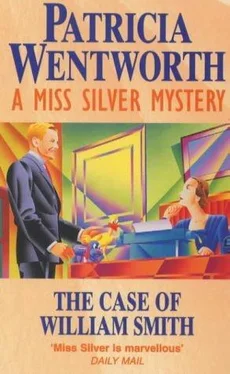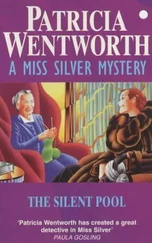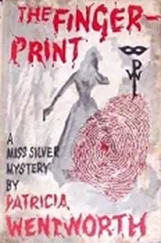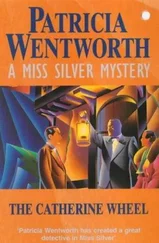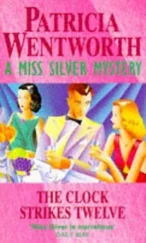Patricia Wentworth - The Case of William Smith
Здесь есть возможность читать онлайн «Patricia Wentworth - The Case of William Smith» весь текст электронной книги совершенно бесплатно (целиком полную версию без сокращений). В некоторых случаях можно слушать аудио, скачать через торрент в формате fb2 и присутствует краткое содержание. Жанр: Детектив, на английском языке. Описание произведения, (предисловие) а так же отзывы посетителей доступны на портале библиотеки ЛибКат.
- Название:The Case of William Smith
- Автор:
- Жанр:
- Год:неизвестен
- ISBN:нет данных
- Рейтинг книги:4 / 5. Голосов: 1
-
Избранное:Добавить в избранное
- Отзывы:
-
Ваша оценка:
- 80
- 1
- 2
- 3
- 4
- 5
The Case of William Smith: краткое содержание, описание и аннотация
Предлагаем к чтению аннотацию, описание, краткое содержание или предисловие (зависит от того, что написал сам автор книги «The Case of William Smith»). Если вы не нашли необходимую информацию о книге — напишите в комментариях, мы постараемся отыскать её.
The Case of William Smith — читать онлайн бесплатно полную книгу (весь текст) целиком
Ниже представлен текст книги, разбитый по страницам. Система сохранения места последней прочитанной страницы, позволяет с удобством читать онлайн бесплатно книгу «The Case of William Smith», без необходимости каждый раз заново искать на чём Вы остановились. Поставьте закладку, и сможете в любой момент перейти на страницу, на которой закончили чтение.
Интервал:
Закладка:
‘Come in, my dear. This is Miss Eversley. And I think you know Mr. Smith – my sister-in-law, Miss Salt.’
Emily stood there in a black woollen dress with an uneven hem. It dipped at the back and lifted where her angular hips took it up, the neck sagged, and the sleeves left the bony wrists uncovered. She poked her head forward, with its thatch of dark hair piled up like a grizzled haycock, turned lack-lustre eyes on Abel, on Katharine, on William, and came into the room and up to the table. When William offered her a chair she looked at him again. The chair might have been a cup of cold poison or an instrument of torture. William was to consider himself detected and spurned. She went round to the other side of the table, chose a ridiculous small chair a long way after Sheraton, set it down as near to Abigail and as far from William as possible, and began to eat cheese and tomato sandwiches with great rapidity, one down, t’other come on. Without saying anything at all she had contrived to cast a blight. She ate her sandwiches and she drank her tea.
Mr. Tattlecombe, with rising colour, reflected that there were trials that were sent by the Lord and you had to put up with them. But he couldn’t feel like that about Emily, and in his opinion she ought to be in a home.
It was whilst Katharine was telling him that they thought of getting married on Saturday that Emily Salt stopped in the middle of a sandwich to make her first remark. Her voice was harsh and deep, almost as deep as a man’s. She said,
‘Marry in haste and repent at leisure – there’s a proverb about that.’
Abel’s eyes went as blue as marbles.
‘And there’s one about least said soonest mended, Emily Salt.’
She might not have heard him. She went on eating sandwiches until she had finished the plate. Then she pushed back her chair so roughly that it fell over, and went out of the room as she had come, looking sideways at Abel, at William, at Katharine, turning on the threshold to look again, and then shutting the door so quickly that it seemed as if it must bang. Only it didn’t – it didn’t make any sound at all. It shut, and there was no sound at all. And no sound from the other side of it. Emily Salt might be standing there, pressed close against the panels, listening. Or she might have gone upstairs, or she might have gone down, or she might have flown away on a broomstick.
Inside the room they went on talking. But everyone’s voice had dropped. Emily might be standing there, pressed up against the door.
Chapter Fifteen
Late that evening the telephone bell rang in Katharine’s flat. William had gone. The noises in the Mews had for the most part died down. One persistent radio still discoursed dance music at a penetrating pitch, and now and again a car came home to one of the old stables turned garage, but most of the daytime noises had ceased. Even if they had not, Katharine would not have noticed them. During these days she was withdrawn from a harsh external world into her own place of happiness and peace. The telephone bell surprised her, because no one knew she was here. The bank or the post office sent on her letters, but she had not given her address to anyone at all. Of course it might be someone ringing up Carol-
She went over to the writing-table, lifted the receiver, and it was Brett Eversley.
‘Katharine – ’
She was both surprised and angry. She had refused him in as definite terms as a woman can use, and she had refused to give him her address. By what means he had discovered it, she had no idea. It wasn’t until her name had been repeated that she spoke.
‘What is it, Brett?’
‘Have I dragged you out of bed? That’s what you sound like.’
‘No.’
‘Katharine, you’re angry.’
‘Yes.’
‘With me?’
‘Yes, Brett, with you.’
‘But why, my dear?’
‘I didn’t give you my address because I wanted to be left alone. I didn’t give you my telephone number.’
He laughed.
‘And I didn’t take no for an answer. Come – it’s a compliment, you know. You don’t expect a man who’s in love with you to resign himself to not knowing where you are, or what you’re doing, or even whether you’re well or ill.’
She bit her lip.
‘You saw me on Wednesday. I wasn’t ill then.’
He said, ‘Wednesday!’ And then, ‘A tantalising drop of water to a man who is dying of thirst! How much satisfaction do you think I got out of seeing you hemmed in by Cyril and old Holden?’
She said, ‘How did you get my telephone number?’
‘I don’t know. Someone told me Carol had lent you her flat. Look here, I won’t bother you, but what’s the sense of shutting yourself up like this? Dine with me tomorrow. I’ll call for you at seven.’
‘I’m afraid I can’t.’
‘Can’t – or won’t?’
‘Both, Brett.’
‘You’re being rather hard on me, Katharine – don’t you think so? What do you think I’m made of? You go away suddenly without a word to anyone – it’s not very easy to put up with. If we’re nothing more, we’re cousins and friends, and – I love you.’
Her tone softened a little.
‘I’m sorry, Brett, it’s no use.’
‘You don’t give me a chance to make you care.’
‘Brett, there isn’t any chance.’
‘I don’t accept that. There’s always a chance. I’m only asking you to give me mine.’
She had begun to feel as if she were holding a door against which he was pushing hard. It tired her. She wished very much that he would go away. She had said no, and she had meant no, and he wouldn’t take it. Where did you go from there? She said,
‘It’s no use, Brett – there’s no chance for me to give you. I’m going to marry someone else.’
She heard him say ‘Who?’ but she didn’t answer that.
She said in a tired voice, ‘It isn’t any use,’ and put the receiver back.
Chapter Sixteen
William Smith was married to Katharine Eversley at St. James’ Church, just round the corner from Rasselas Mews, at half-past two on Saturday afternoon. All the morning they painted together in the workshop behind Tattlecombe’s Toy Bazaar. At one o’clock William drove Katharine home. They had lunch together, after which he put on his best suit, a neat and quite undistinguished blue serge, in what had been Carol’s spare room. It was going to be his dressing-room now. He unpacked and put his things away with the feeling that this unbelievable happiness seemed real and felt real, but all the same he didn’t see how it could possibly be true. There was something reassuring about getting out his shaving things and putting shirts away in a drawer. He put everything away very neatly. Every time he folded anything or opened a cupboard door it seemed to make it more probable that he was going to marry Katharine, because if he wasn’t he wouldn’t be unpacking his things in her flat.
Katharine dressed for her wedding with as much care as if the congregation in whose face she was going to be married to William would fill the church and set up the highest possible standard of distinction and elegance, instead of consisting of Abigail Salt and Mrs. Bastable, together with any stray passer-by who might scent a wedding and drop in to see the bride. The dress, of rather a deep shade of blue, threw up her skin and brought out the gold lights in her hair. The long matching coat with the touch of fur at the neck was soft and warm. The small hat, hardly more than a cap, was made of the same stuff, with an odd little knot of the fur.
They walked round to the church together and were with Abigail Salt and Mrs. Bastable as witnesses. To Katharine the church was not empty, or cold, or dark. It was full of her love and William’s.
Читать дальшеИнтервал:
Закладка:
Похожие книги на «The Case of William Smith»
Представляем Вашему вниманию похожие книги на «The Case of William Smith» списком для выбора. Мы отобрали схожую по названию и смыслу литературу в надежде предоставить читателям больше вариантов отыскать новые, интересные, ещё непрочитанные произведения.
Обсуждение, отзывы о книге «The Case of William Smith» и просто собственные мнения читателей. Оставьте ваши комментарии, напишите, что Вы думаете о произведении, его смысле или главных героях. Укажите что конкретно понравилось, а что нет, и почему Вы так считаете.
